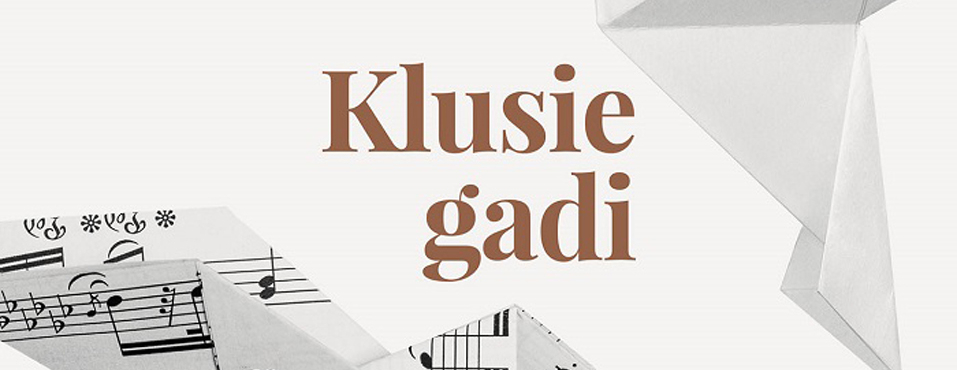For a few months now, for obvious reasons, books have not been read as before. It is possible – but time will tell – not written. The war in the immediate neighborhood introduces, as we think of literature, a correction, especially of works that tell the epochs of history and political regimes we know, forcing parallels and contexts even where they would not have been so vivid until recently. However, this process seems at least partially irreversible.
She is not dumb
Czech writer Alena Mornstinova, known to the reader after a novel published in Latvian in 2019 Hanathe new work just launched Quiet years, as the publisher ‘s comment confirms, seems to be talking about the world’ s global processes – neither wars nor revolutions. It seems to be a story about a person and a family. However, in the background of this person and this family, a wide, dark river of history is constantly flowing, sometimes only hitting the splashes, but sometimes pulling into the depths what has approached too carelessly. Completely forgetting history at any moment we are not allowed.
Quiet years is a message designed in a way that may be a little challenging for readers, but has already been used quite often in literature, starting with the story from two different characters and two times and gradually bringing the two threads closer together until they end into a single story. The message of Bohdan and her father, a young modern woman, alternates in the novel; following this principle, the chapters other than the last are also named “father” or “daughter” respectively and are numbered. However, for those who get to know the story of the story, it will become clear that these seemingly formal signs also go far beyond the superficial. The same goes for the whole novel: you want to compare the text with a masterfully made pre-war chest of drawers, whose heavy, smooth drawers hide more than one invisible compartment.
Bohdan’s father Svatopluks (here must take a break to tell the translator Jānis Krastiņš, who in the footnotes deciphered the meaning of this and other names unfamiliar to the Latvian ear) is born in the Czech Republic, which is not divided by the Berlin Wall and the rest of the world. , but even there life after the Second World War is not easy. Growing up in the Soviet system, Czechoslovakia had longed for the near abroad, while the Czechs themselves, both before and after the so-called Prague Spring and the interference of the “friendly” neighbors in internal affairs, had to separate their thoughts from their illicit ones. , the right opinion of what to express only in the kitchen and only to your own, even without clearly knowing when you will become a traitor.
Loyal to the ideals of communism, Svatopluks, who has been fascinated by music since childhood, encounters Eva, who was brought up in disbelief in these ideals, and the feelings of young people seem to cross the barrier between the two. It turns out to be a mere appearance, but it is not these differences of opinion that are the reason why Bohdana, who was born more than thirty years later, already in a time of change, is trying to remember a secret. This mystery, hidden in the past of a long-dead mother and a harsh father, indirectly leads to a fact that the reader realizes only gradually and which explains the title of the novel in one respect: namely, Bohdan has been silent since a time in his childhood. She is not dumb, but not speaking helps not to be revealed: neither to the lifelong father, nor to the benevolent, albeit too passive, stepmother Bela, to her friends, not even to her husband. By relying solely on the inner narrative of his self, Bohdana has become accustomed to language aches.
The last sentence
Quiet years thus, like the river of history already mentioned, it flows along two beds – the life of Bohdan’s parents in all the post-war years and the existence of Bohdan himself, along with the outlined but often fatal regime changes in the background – until the riddle is revealed. However, why Grandma, Eva’s mother, calls Bohdan on the deathbed Blank is just the top of the drawer — other insults and misunderstandings, pains and entanglements like any other family’s, are much more deeply tolerated. Bohdan’s psychological – rather than clinical – dumbness is a great metaphor for the author’s well-known statement “we / our family / don’t talk about it with our own”.
“How little do we know about each other,” Māris Čaklais once wrote. And with this “little knowledge,” we continue to hurt – by not speaking, by assumptions, by what is said inappropriately and untimely, by what is not said in time and place, by unassigned questions and unanswered answers. In an interview, the author claims that a person can be hurt in two ways – with words and with silence – and both are dangerous weapons. However Quiet years shows that the silence imposed by the times, the silence of the mills of history and politics, has infiltrated people ‘s consciousness and thinking, and that secrets and lies have become the second self for too many. In this context, the story of Svatopluk and Bohdan is not the only one that raises unanswered questions in the novel about the right course of action in a dictated environment, where speaking and silence, as well as any other action and inaction, will have different but equally tragic consequences.
Both threads of the message are not designed to guide the reader towards a solution – in fact, the reader remembers the riddle solved by Bohdan much sooner than the end of the novel. The only question is not “what happened / will happen?”, But “how did / will it happen?”. The fact that the story of the two messages is / will be the same is also indicated by the fact that the last sentence of each chapter is repeated almost verbatim in the first sentence of the next chapter, thus symbolically casting a bridge between the two characters and times.
In this way, the author masterfully shows that the stories are two sides of the same mosaic, and refuses to decide who is the real victim and which side is right. In the end, when all the pieces are in place, the image is formed on both sides – different, but readable. Finally, Bohdan’s and her father’s stories reveal that the two “quiet years” are not only factual but also conceptually the same – the father’s emotional silence contrasts with Bohdan’s physical silence, but the two choices, while understandable, have not made life easier for anyone. , neither to the other, nor to the relatives of both.
The last sentence of the novel, which I will not quote here, adds a point and at the same time many points to these “quiet years”. This sentence can be the key to both doors. When silence hurts and words hurt, it seems to leave no choice. But perhaps the choice – insecure, intimidating, fragile – still exists.
–


